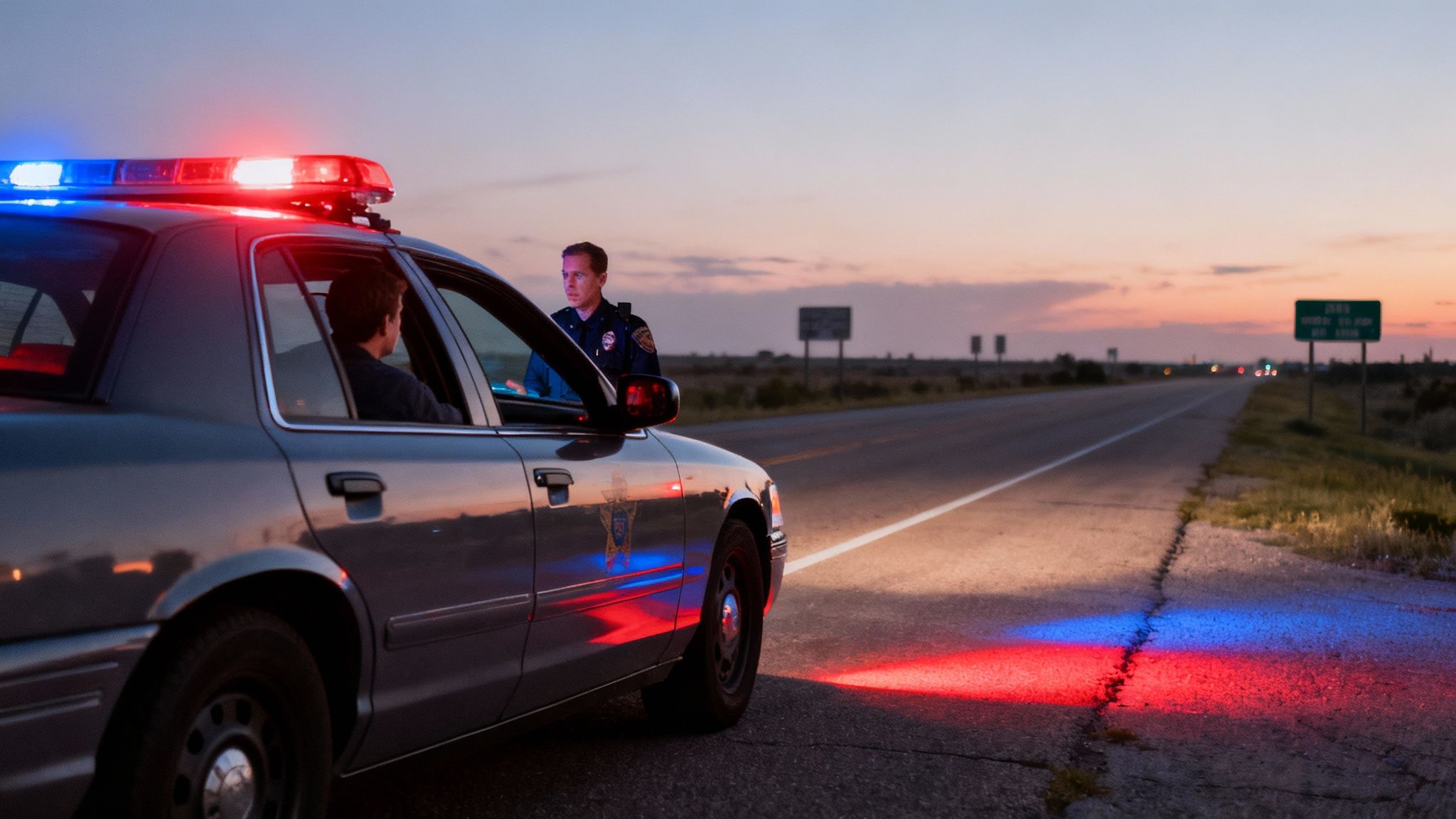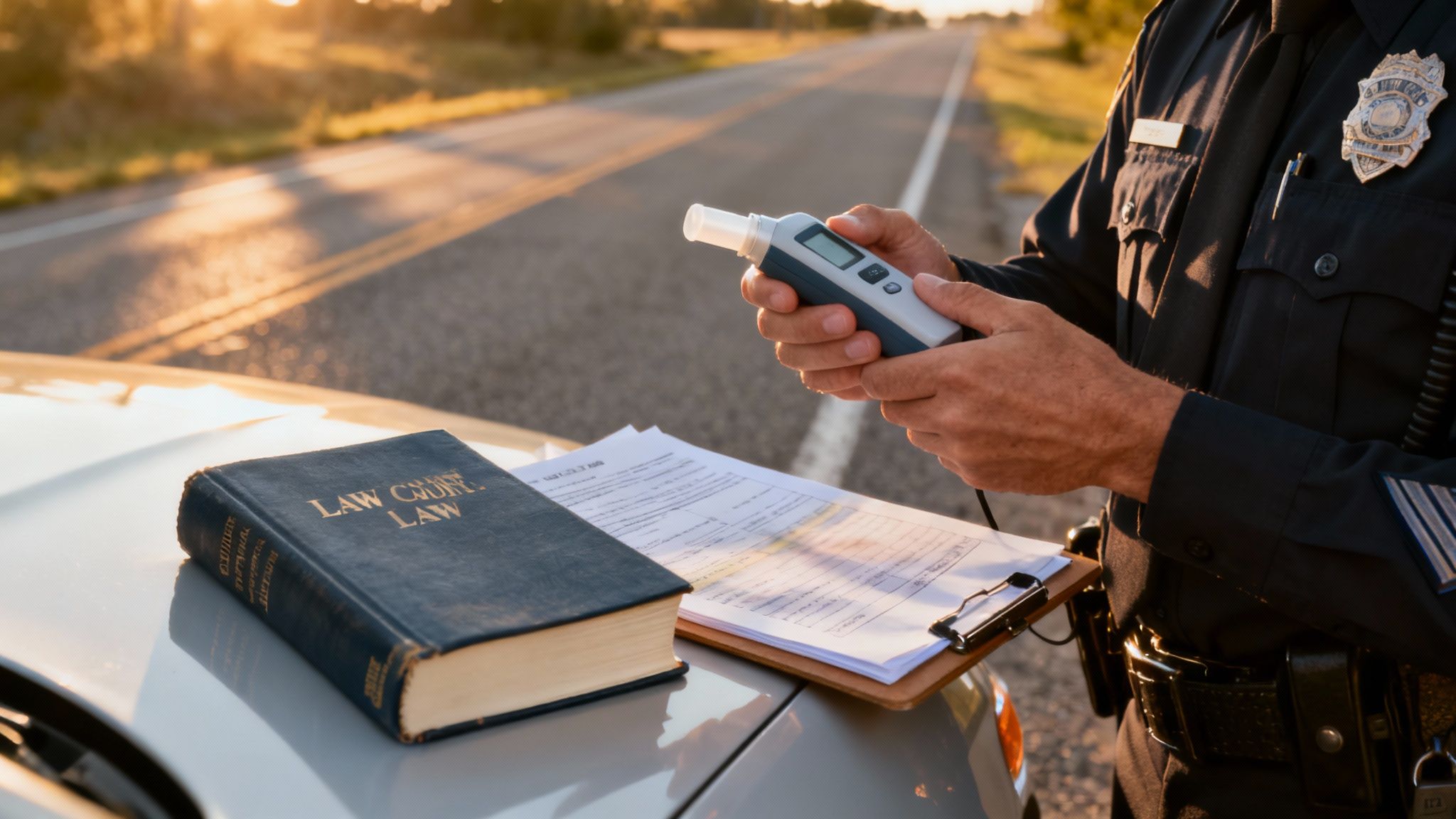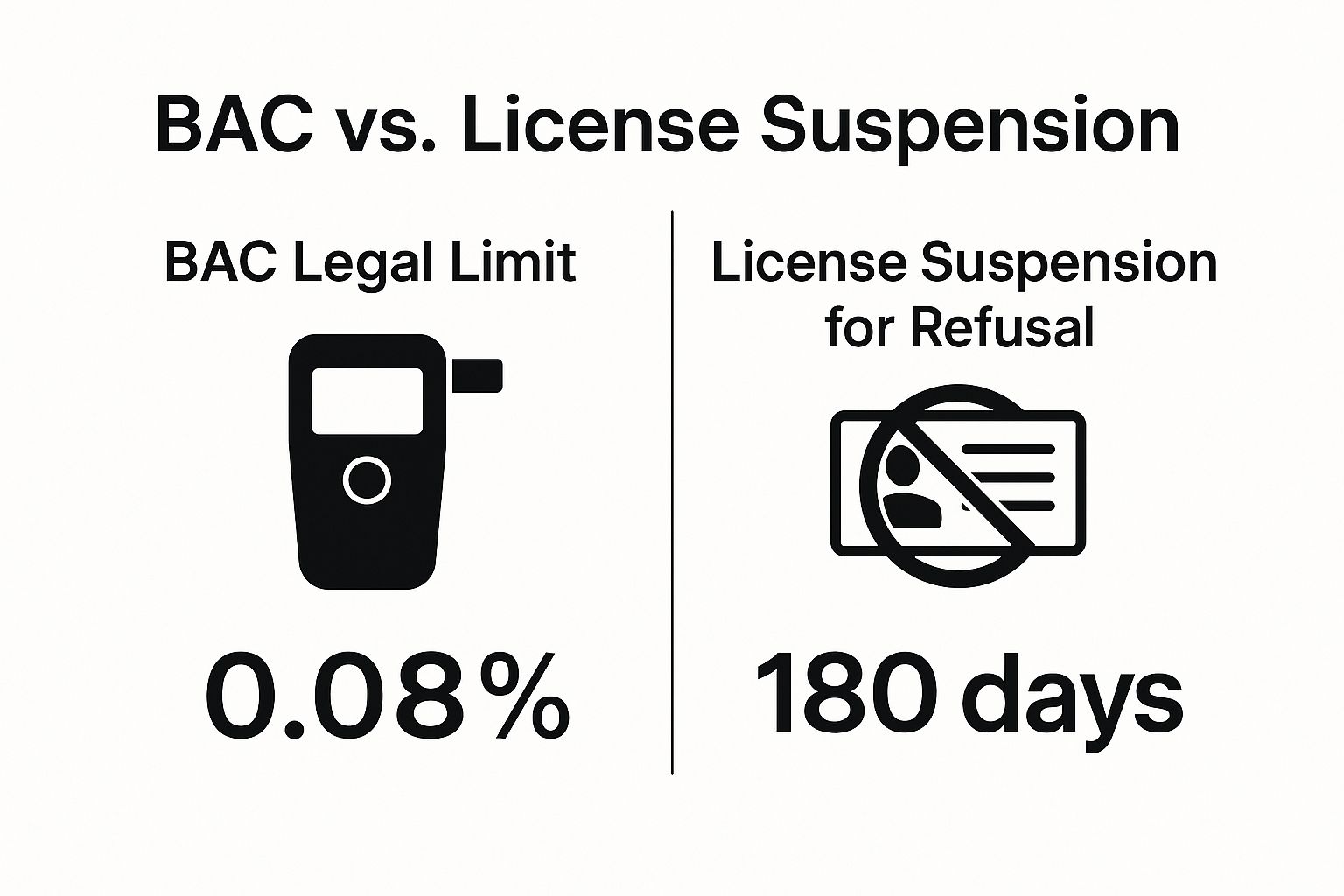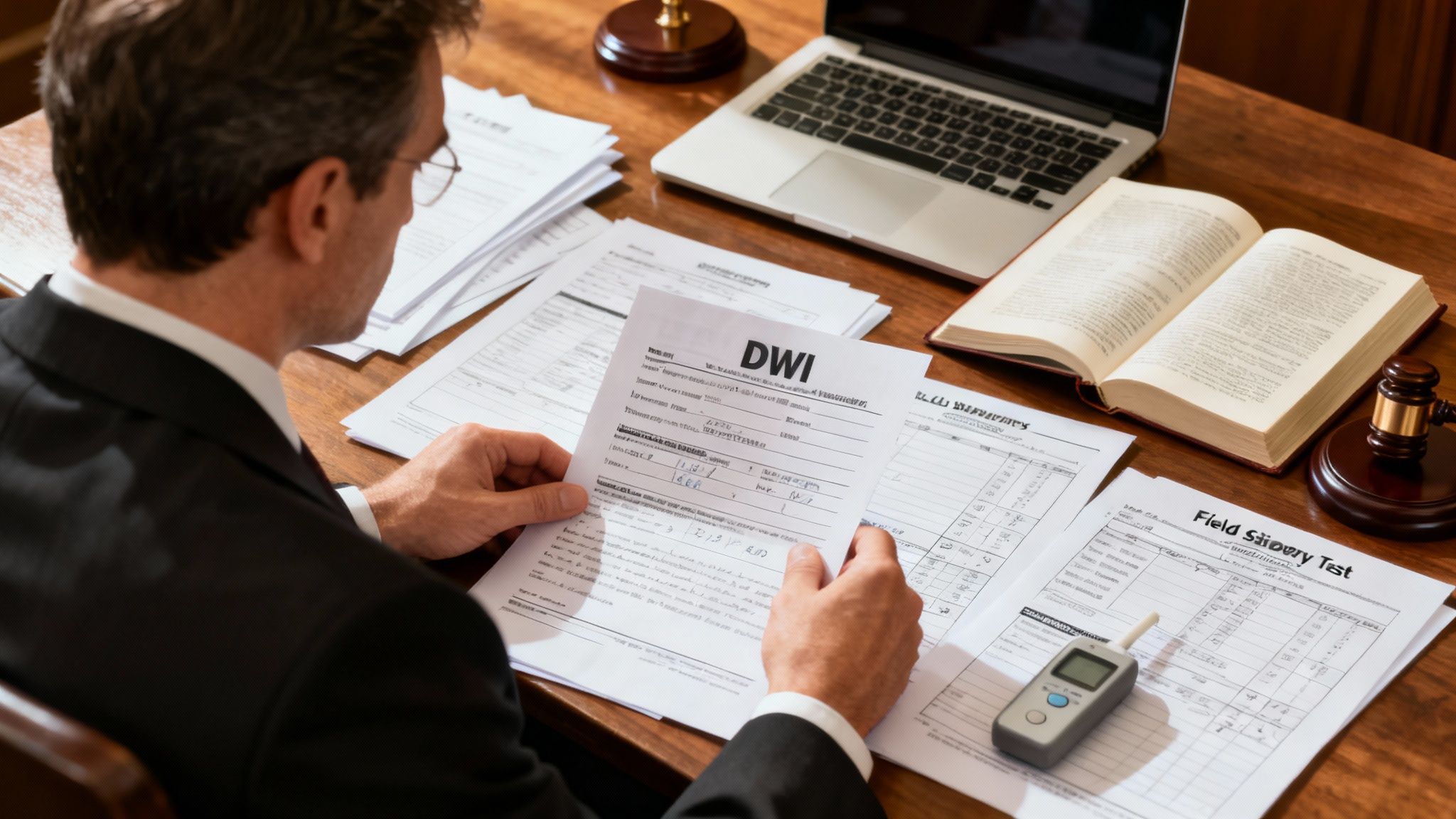A DWI arrest can be overwhelming—but you don’t have to face it alone. Being charged with DWI in Texas isn't just about a traffic ticket; it's a serious criminal charge that can disrupt your life. At its core, a DWI, or Driving While Intoxicated, means the state is accusing you of operating a motor vehicle in a public place while legally intoxicated.
But "intoxicated" has a broader legal meaning than you might think. Under Texas law, it can mean one of two things:
- You lack the normal use of your mental or physical faculties because of alcohol or drugs.
- You have a blood alcohol concentration (BAC) of 0.08% or higher.
Understanding this dual definition is the first step toward building a strong defense for your case.

What Really Happens During a Texas DWI Arrest
Getting pulled over and arrested for DWI is a stressful, disorienting experience. It's easy to feel like you've already been found guilty, but remember—an arrest is just the beginning of the legal process, not the end. The charge itself falls under Texas Penal Code Section 49.04, and it gives prosecutors significant room to build their case.
Here’s a critical detail most people miss: the state doesn't need a breath or blood test showing a 0.08% BAC to convict you. They can rely entirely on the first definition of intoxication—the subjective claim that you lost the "normal use" of your faculties.
This means the officer’s observations about your driving, the way you spoke, your balance during field sobriety tests, or even the smell of alcohol can all be used as evidence against you. Even if your BAC is under the legal limit, the District Attorney can still argue you were too impaired to drive safely.
The Sobering Statistics Behind DWI Enforcement
Why does Texas take these cases so seriously? The state’s own data provides some insight.
From 2014 to 2023, crashes involving impaired drivers were responsible for over 37% of all traffic fatalities in Texas. This staggering statistic is a major reason why law enforcement agencies and prosecutors pursue DWI cases with such intensity. You can explore more of the state's crash data in Texas's traffic safety reports.
Heads Up: A DWI arrest can happen on private property if the public has access to it. Think apartment complex parking lots, shopping center garages, or even the drive-thru lane at a fast-food restaurant. The law cares about whether a place is "public," not whether it's publicly owned.
An arrest is simply an accusation, and you have every right to challenge the evidence the state brings against you. A skilled Houston DWI lawyer will dig into every part of your case—from questioning the legality of the initial traffic stop to scrutinizing how chemical tests were administered—to protect your rights and your future.
Navigating BAC Testing and the Implied Consent Law
When you see flashing lights in your rearview mirror and get pulled over for a suspected DWI, the situation can escalate quickly. Two concepts immediately come into play: Blood Alcohol Concentration (BAC) and the Implied Consent Law.
How you handle the next few moments at the roadside can dramatically impact both your criminal case and your ability to drive. It’s an overwhelming spot to be in, but understanding these rules is your first line of defense.

Think of BAC as the specific measurement police use to prove you were intoxicated. In Texas, the key number for most adult drivers is 0.08%. If a chemical test—usually a breathalyzer or a blood draw—shows your BAC at or above that limit, the prosecutor has a powerful piece of evidence to use against you.
But just because a machine produces a number doesn't mean it's the final word. These tests are far from foolproof. The equipment can malfunction, the officer can administer the test improperly, and a skilled Houston DWI lawyer knows exactly how to challenge the validity of those results.
The Power of Implied Consent
So, how do officers get a sample to test your BAC in the first place? That’s where a crucial piece of Texas law comes into play: Implied Consent.
The moment you get behind the wheel on a public road in Texas, you have automatically—or "implicitly"—agreed to provide a breath or blood sample if you are lawfully arrested for DWI. You don't sign a form; it's just part of the deal for having a driver's license.
This law gives law enforcement significant leverage. While you still have the right to refuse the test, saying "no" isn't a get-out-of-jail-free card. Refusing triggers an entirely separate set of consequences that have nothing to do with your criminal DWI case.
A test refusal kicks off an automatic driver's license suspension called an Administrative License Revocation (ALR). This is a civil penalty handled by the Texas Department of Public Safety (DPS), not the criminal courts.
Consequences of Refusing a Chemical Test
Deciding to refuse a breath or blood test leads to immediate administrative penalties against your license. The state doesn't take refusals lightly, and the consequences are designed to be a strong deterrent.
Here’s what you’re up against:
- First Refusal: If this is your first DWI arrest and you refuse the chemical test, your driver’s license is automatically suspended for 180 days.
- Subsequent Refusals: If you have any prior alcohol-related police contact on your record, a refusal will get your license suspended for a full two years.
These suspensions happen automatically unless you fight back, and the clock is ticking. You can learn more by checking out our comprehensive guide to Texas Implied Consent laws. An attorney can help you challenge the ALR suspension, but you only have a very short window of time to request a hearing. A skilled Texas DUI attorney knows how to fight a DWI in Texas by examining every detail, from the reason for the traffic stop to the way the chemical tests were handled.
Understanding the Penalties for a Texas DWI
After a DWI arrest, one of the first questions that races through your mind is, "What's going to happen to me?" It's a valid concern. Understanding the potential consequences isn't about scaring you—it's about arming you with the knowledge needed to build a smart, strategic defense.
Texas law is structured to make DWI penalties progressively tougher with each offense. Knowing what's at stake helps you see the real value in fighting to minimize, or even eliminate, these life-altering penalties. For most people, a first DWI in Texas is charged as a Class B Misdemeanor, though that can change depending on the details of your arrest.
Penalties for a First DWI Conviction
Even a first-time offense carries significant consequences that can impact your freedom, your finances, and your ability to get to work. While every case is different, the law sets a clear baseline for what you can expect.
If you are convicted of a first-time DWI, the penalties can include:
- Jail Time: You could face a minimum of 72 hours behind bars, with a maximum sentence of 180 days in county jail.
- Fines: The court can impose a fine of up to $2,000, not including court costs and other administrative fees that add up quickly.
- DWI License Suspension: Expect to lose your driver's license for anywhere from 90 days to one full year.
- Annual Surcharges: The Texas Department of Public Safety (DPS) will require you to pay an annual fee for three years just to keep your license. These "surcharges" can add up to thousands of dollars.
And that's just the start. A judge can also order DWI education classes, community service, and the installation of an ignition interlock device (IID) on your car. You can get a much deeper look into what a conviction means in our complete guide to first-offense DWI penalties.
The infographic below puts two critical numbers into perspective: the legal BAC limit and the immediate penalty for refusing a breath test.

This visual shows how Texas's Implied Consent law works. Refusing the test triggers an administrative penalty that's completely separate from the criminal case you'll be facing in court.
How Penalties Get Harsher: DWI Enhancements
Certain factors, often called "aggravating circumstances," can instantly make the charges and penalties much more severe, even if it's your first offense.
For instance, if your Blood Alcohol Concentration (BAC) was 0.15% or higher—nearly double the legal limit—the charge gets bumped up from a Class B to a Class A Misdemeanor. That means the potential jail time doubles to one year and the maximum fine skyrockets to $4,000.
The most serious enhancement? Having a child passenger under the age of 15 in your vehicle. That single factor automatically turns a misdemeanor DWI into a state jail felony.
What to Expect for Second and Third Offenses
If you're facing a subsequent DWI charge, the stakes get incredibly high. The state assumes you didn't learn your lesson the first time, and the penalties reflect that.
To give you a clear picture of how things escalate, we've put together a table comparing the potential penalties for first, second, and third offenses.
Texas DWI Penalties by Offense
| Penalty Type | First DWI Offense | Second DWI Offense | Third DWI Offense (Felony) |
|---|---|---|---|
| Charge Level | Class B Misdemeanor | Class A Misdemeanor | 3rd Degree Felony |
| Jail Time | 72 hours to 180 days | 30 days to 1 year | 2 years to 10 years in prison |
| Maximum Fine | Up to $2,000 | Up to $4,000 | Up to $10,000 |
| License Suspension | Up to 1 year | Up to 2 years | Up to 2 years |
As you can see, a third DWI is a felony conviction that comes with prison time, massive fines, and a long-term impact on your rights and future. This is why a strong defense is not a luxury—it's a necessity.
Managing the Two Cases You Face After an Arrest
When you're arrested for a DWI in Texas, the night you spend in jail is just the beginning. What most people don't realize is that an arrest kicks off two entirely separate legal battles that run on parallel tracks. This means you must defend yourself on two fronts, and overlooking one case while you’re focused on the other can have devastating consequences for your freedom and your driver's license.
The first front is the one everyone expects: the criminal case. This is where the State of Texas, represented by a prosecutor, formally charges you with the crime of Driving While Intoxicated. This battle is fought in criminal court and involves hearings, plea negotiations, and potentially a trial where a jury decides your fate.
But there’s a second, faster-moving battle happening at the same time. This one is a civil case against the Texas Department of Public Safety (DPS), and it’s all about your right to drive. It's called the Administrative License Revocation (ALR) case, and its only goal is to determine whether or not your license should be suspended.
The Critical 15-Day Deadline
This is where things get incredibly time-sensitive. The moment you are arrested, a clock starts ticking. You have exactly 15 days—and not a minute more—to formally request an ALR hearing to fight the automatic suspension of your driver's license.
If you miss this 15-day window, your license will be suspended. There are no do-overs or extensions. This is arguably the most urgent deadline in the entire DWI process, and failing to meet it means you give up your right to challenge the DWI license suspension entirely.
Requesting an ALR hearing does more than just give you a chance to save your license. It also gives your attorney a priceless opportunity to question the arresting officer under oath long before your criminal trial. This testimony can become a cornerstone of your defense strategy.
Why You Need an Attorney for Both Fronts
Trying to manage these two cases on your own is like trying to fight in two different directions at once. What happens in the ALR case can directly affect your criminal case, and vice versa. Only an experienced Houston DWI lawyer understands how to navigate this complex legal terrain and use one case to gain an advantage in the other.
A skilled attorney will immediately go on the offensive on both fronts:
- For the ALR Case: We will file the hearing request right away to protect your driving privileges. This also serves as a "first look" at the state's evidence and the officer's story.
- For the Criminal Case: We will dissect every detail of your arrest—from the reason you were pulled over to the administration of any chemical tests—looking for weaknesses in the prosecutor's argument.
You don't have to face this two-front battle alone. Our job is to shield you from the system's complexities, defend your rights at every turn, and fight for the best possible outcome in both your ALR hearing and your criminal case.
Building a Strong Defense Against Your DWI Charge

It’s one of the most important things to remember: a DWI arrest is an accusation, not a conviction. The burden falls entirely on the prosecution to prove its case beyond a reasonable doubt, and a proactive, strategic defense can expose weaknesses in their evidence. An experienced Houston DWI lawyer never takes a police report at face value.
Instead, we meticulously deconstruct every moment of your arrest. The goal is to hunt for procedural errors, question the reliability of the state's evidence, and fiercely protect your constitutional rights. This deep-dive investigation is the bedrock of any successful defense.
Questioning the Initial Traffic Stop
The entire DWI case is built on a single foundation: the legality of the initial traffic stop. An officer can't just pull you over on a hunch. They must have reasonable suspicion that you violated a specific traffic law. Was the stop actually justified, or was it a "pretext stop" where the officer was just looking for an excuse?
We will put the officer’s stated reason under a microscope. This often includes things like:
- Minor Traffic Violations: Did you really fail to signal a lane change, or were you just weaving slightly within your own lane? One is a violation; the other often isn't.
- Anonymous Tips: Was the stop based on a vague, uncorroborated tip from an anonymous caller? That’s often not enough to justify pulling you over.
- Sobriety Checkpoints: While less common in Texas, if you were stopped at a checkpoint, did law enforcement follow the strict legal protocols required to operate one?
If we can prove the initial stop was unlawful, any evidence gathered after that moment—from field sobriety tests to breathalyzer results—can be thrown out. This often leads to a full dismissal of the case.
How to Fight a Breath Test Result
The evidence used most frequently in a DWI case is also, ironically, some of the most questionable. Field sobriety tests are notoriously subjective, and breathalyzer machines are far from perfect.
Standardized Field Sobriety Tests (SFSTs), like the walk-and-turn or one-leg stand, are designed to be difficult even for a perfectly sober person. Your performance can be affected by medical conditions, bad knees, sheer nervousness, fatigue, or even the type of shoes you were wearing. A skilled attorney knows how to challenge the officer’s biased interpretation of your performance and show a jury just how unreliable these roadside tests really are.
A breathalyzer result that seems like a slam dunk for the prosecution can often be challenged. These machines require strict calibration schedules, regular maintenance, and proper administration by a trained officer. An experienced attorney knows exactly what to look for when requesting maintenance logs and officer training records to see if that number is even valid.
Likewise, blood test results aren't bulletproof. They can be contested based on how the sample was drawn, stored, and analyzed. Any break in the "chain of custody" can make the sample inadmissible in court. Our legal team explores numerous defense strategies to protect your rights from start to finish.
Ultimately, a strong defense is about showing the judge and jury that the state’s evidence isn't nearly as solid as it seems. By challenging the stop, the tests, and the officer’s procedures, we create the reasonable doubt and leverage needed to fight for a charge reduction, a dismissal, or a "not guilty" verdict at trial. You don't have to accept the initial charge as the final word.
Your Next Steps to Protect Your Rights and Future
After a DWI arrest, what you do in the next few days can make or break your case. This isn't an exaggeration—it's a reality of the Texas legal system. The single most important thing you need to focus on right now is the 15-day deadline to request an Administrative License Revocation (ALR) hearing.
If you miss this window, your driver's license will be automatically suspended. No questions asked.
It's completely normal to feel overwhelmed after an arrest, but this is the moment to take control. A DWI charge is serious, but it's not a conviction. You have the power to fight back and build a strong defense, and that process starts today.
The decisions you make right now will have a direct impact on how your case unfolds. Working with an experienced Houston DWI lawyer from the very beginning ensures you won't miss a critical deadline and that your rights are protected from day one.
You don't have to navigate this alone. Let our team put our experience defending Texans against DWI charges to work for you—protecting your license, your record, and your future.
We invite you to contact The Law Office of Bryan Fagan, PLLC for a free, confidential case evaluation. There’s no obligation, just a straightforward opportunity to get the professional guidance you need to fight a DWI in Texas.
Got Questions About Your Texas DWI? We Have Answers.
Getting arrested for a DWI in Texas opens the floodgates to a hundred different questions. The uncertainty can be overwhelming. Getting clear, straightforward answers is the first step toward taking back control of your situation.
Here are some of the most common questions we hear from clients right after a DWI arrest.
What's the Real Difference Between DWI and DUI in Texas?
This is easily one of the most common points of confusion, and the distinction is critical.
In Texas, DWI (Driving While Intoxicated) is the charge that applies to adults 21 and over. You can be charged with DWI if you're caught operating a vehicle while impaired by alcohol or drugs, or if your Blood Alcohol Concentration (BAC) is 0.08% or higher. It's the standard charge for adult drunk driving.
DUI (Driving Under the Influence), on the other hand, is a specific offense for minors under 21. For a minor to get a DUI, they only need to have any detectable amount of alcohol in their system. While both are serious offenses, a DWI is a more severe criminal charge that comes with much heavier penalties.
Can I Ever Get a DWI Off My Record?
Yes, in some cases, you can. This is a huge reason why fighting your charge from the very beginning is so important.
If your case gets dismissed or if you're found not guilty at trial, you may be eligible for an expunction. Think of an expunction as a legal eraser—it completely removes the arrest from your record, as if it never happened.
Another possibility is an order of non-disclosure, which seals your record from public view. This is often an option if you successfully complete a deferred adjudication probation. A Houston DWI lawyer who knows the system can look at the specifics of your case and map out the best strategy for clearing your name and protecting your future.
Am I Required to Do Those Roadside Sobriety Tests?
Absolutely not. You are under no legal obligation to perform the Standardized Field Sobriety Tests (SFSTs) in Texas. The walk-and-turn, the one-leg stand, the eye test—they are all 100% voluntary. You have the right to politely decline.
Let’s be honest: these tests are subjective and designed to be difficult. Plenty of perfectly sober people would struggle to perform them flawlessly on the side of a busy road. Refusing them simply means you aren't handing the officer questionable evidence that a prosecutor will later try to use against you.
Even if you refuse, the officer might still decide to arrest you based on other observations, but refusing the tests is a crucial step in defending your rights from the get-go.
A DWI arrest can feel like a dead end, but it’s really just the beginning of your defense. At The Law Office of Bryan Fagan, PLLC, we believe one mistake shouldn't define the rest of your life. Contact us for a free, confidential case evaluation to discuss your options and start building your defense today.

